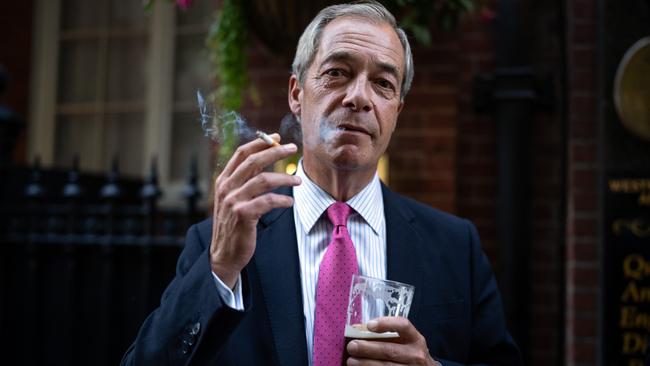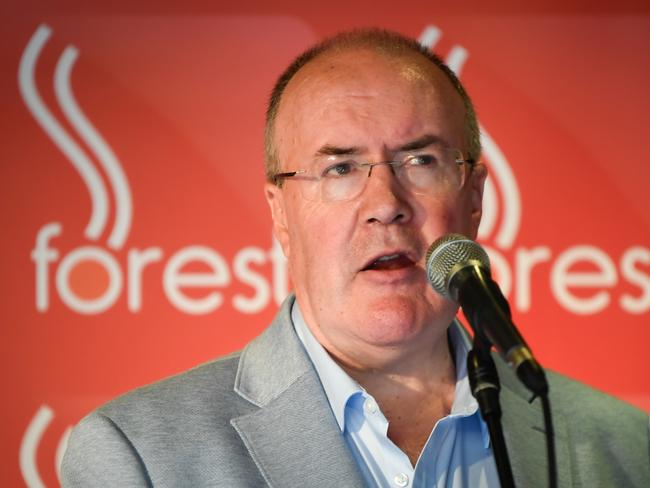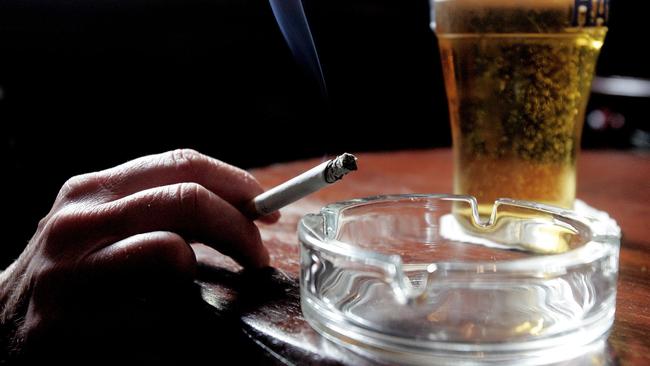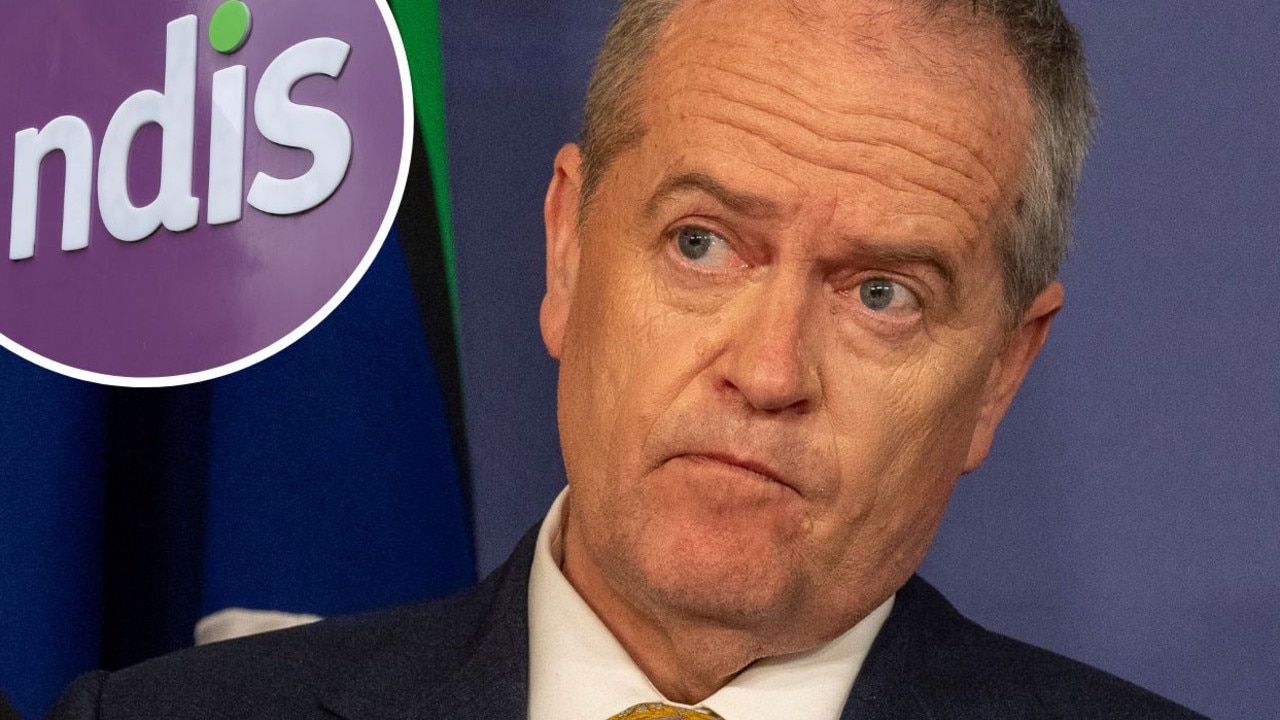UK may ban smoking in pubs as other countries change laws
Plans to ban smoking at UK pubs has politicians pointing the finger at ‘nanny state’ Australia, with one threatening to never go out for another pint. See how bans in other countries work.
Health
Don't miss out on the headlines from Health. Followed categories will be added to My News.
Ruddy men laugh loudly as they spill out of the pub into the beer garden to enjoy a bit of chit-chat about that drama-filled first half of football. Sloshing their pints, they debate whether the last foul should have been a penalty, and as one of them goes to light up a cigarette, another eager football fan from a few feet away comes over to ask him for a lighter. She too joins in on the banter, and despite barracking for the opposite team, exchanges a few high-fives and joins them to watch the game as they hurry back inside for the second half.
This scene is like clockwork, particularly on weekends during football season, when Brits fill pubs to cheer on their team.
But outspoken politician and avid smoker Nigel Farage is prepared to give that up, forever, if the government goes ahead with a controversial plan to ban outdoor smoking in Brits’ beloved watering holes.

So outraged at the proposal, the Reform UK party leader said he would “never go to a pub again” if the Labour Party passes tighter restrictions on smoking outdoors as part of its ambition to phase out tobacco.
“The rumoured ban on smoking in pub gardens or on the pavement outside pubs will kill off the traditional pub forever,” he said.
“For my own part, I simply would not go to the pub ever again if these restrictions are imposed.”

The move – which would restrict outdoor smoking outside pubs and restaurants, clubs, universities, children’s play areas, small parks, and potentially shisha bars – would be part of the government’s tobacco and vapes bill announced in its legislative program in July. The law would ban anyone born after 2008 from ever legally purchasing tobacco. The plan was first created by conservative Prime Minister Rishi Sunak and supported by current Labour Prime Minister Keir Starmer.
Its thrown UK’s smoking laws into the spotlight and pegged them up against other countries which clamped down on the same restrictions years ago
Asked about the possible ban, Starmer did not deny the plans.
“My starting point on this is to remind everybody that over 80,000 people lose their lives every year because of smoking,” he said.
“That is a preventable death, it’s a huge burden on the NHS (National Health Service) and the taxpayer. We are going to take decisions in this space, more details will be revealed, but this is a preventable series of deaths and we’ve got to take action to reduce the burden on the NHS and the taxpayer.”
The government said smoking is still the number one preventable cause of death, disability and illness, costing the NHS and the economy an estimated £17 billion ($A33.3 billion) every year.

British Beer and Pub Association chief executive Emma McClarkin called on the government to reconsider the “misguided” restriction.
“For generations pubs have welcomed people, not turned them away, have helped combat loneliness and provided a vital place where people meet and make friends,” she said.
However, Dr Layla McCay of the NHS Confederation said the proposed restrictions would reduce “the huge problems that are caused to the individual and to society from smoking”.
Chief executive of the charity Action on Smoking and Health, Deborah Arnott, said the public “should not have to breathe in tobacco smoke in places like children’s play areas and seating areas outside pubs, restaurants and cafes”.
Director of the Freedom Organisation for the Right to Enjoy Smoking Tobacco (Forest), Simon Clark, said whether people choose to smoke was a matter for them and not the government.

“When you start using smoking bans to encourage smokers to quit, that’s not encouraging them to quit, that’s bullying and coercing them,” he said.
“If you stop people smoking in pub gardens you’ll potentially drive them to smoke more at home where they’ll potentially smoke in front of children – these policies can be counter productive.”
Australia, often a model for UK policy makers or vice-versa, has led the way by clamping down on outdoor smoking with similar bans in various outdoor spaces.
Rules vary from state to state, with designated smoking sections or zones set up at pub gardens and parks to protect non-smokers from secondhand smoke. At beaches and playgrounds, smoking is banned altogether.
The reforms in enclosed spaces started in the ’90s, flowed onto outdoor terraces and dining areas in the early 2000s before, with its plain packaging act, Australia became the first country in the world to require tobacco products to be sold label-free in 2011.
Daily smoking rates in Australia have halved from 16 per cent in 2000 to 8.3 per cent, according to the Australian government. That is also two thirds less than the 24 per cent of smokers Australia had in 1991,

Across the ditch, New Zealand followed with a slew of anti-smoking measures before shocking the globe in 2022 when former prime minister Jacinda Ardern proposed a world-first law to ban smoking for future generations.
The pioneering legislation introduced a steadily rising smoking age to stop those born after January 2009 from ever being able to legally buy cigarettes. However, the country’s new coalition government repealed the law, which would have come into effect two months ago.
“Australia, to us, seems to be much more of a nanny state than the UK, but clearly we’re heading in that direction,” Clark said.
Closer to the UK, even some European countries, widely-known for their out-of-control smoking habits, have tightened restrictions recently.
It’s part of a joint European Union plan – Europa’s Beating Cancer Plan – to create a tobacco-free generation by 2040.
SMOKING STANCE AROUND THE WORLD
PORTUGAL
Last year, Portugal’s government put forward a proposal to extend a ban on smoking to outdoor areas including covered terraces and to restrict tobacco sales, as part of a grand plan to raise a tobacco-free generation by 2040.
If approved, smoking next to public buildings such as schools, universities, hospitals or sports venues, outside restaurants, bars and coffee shops will be banned.
FRANCE

France is also aiming for a tobacco-free generation, but even earlier, by 2032.
As part of the ambition, the government announced plans to enforce bans on smoking in parks and on beaches in November last year.
The government will also increase prices from 10 euros to 13 euros ($A16.50 to $A21.50) a pack in 2027, ban disposable e-cigarettes, and ban smoking in public spaces such as parks, beaches, forests and other public areas.
SPAIN

In April this year, Spain approved its anti-smoking plan, which plans to increase the number of spaces where smoking is not allowed in the next three years. Although the plan only “recommends” people not smoke in terraces of bars and restaurants, it will be the basis for a future law that could include such restrictions.
AROUND THE WORLD
Mexico enforced one of the world’s most stringent smoking laws, with its total ban in public places, including hotels, beaches and parks, as well as stopping advertising.
Also last year, Canada became the first country to introduce printed health warnings on individual cigarettes in a bid to curb tobacco as the leading preventable cause of illness and death in the country, killing some 48,000 people each year.
Since 2002, India has had a ban on smoking in public spaces although businesses can create specific smoking zones.
Ireland fully banned smoking in the workplace, including bars and restaurants in 2004. Today, it plans to raise the legal age for buying cigarettes and other tobacco products from 18 to 21.
More Coverage
Originally published as UK may ban smoking in pubs as other countries change laws




